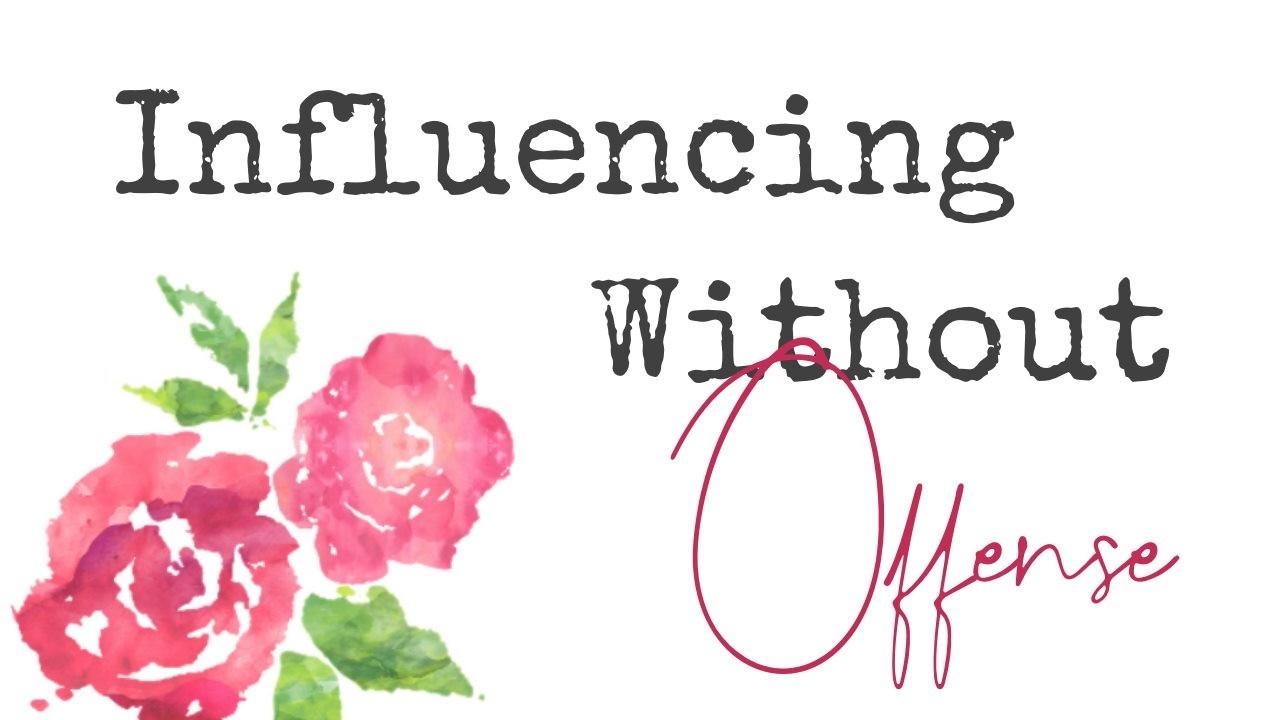Influencing Without Offense
Jun 16, 2020
Wow. 2020 has been something else, hasn’t it?
In the last several months, social media has made me want to take up drinking or send everyone to bed early without supper. Seriously. People use words in the most horrible ways.
I started to write a post for my personal Facebook, but when the word count tipped to almost 700, realized I needed to share it with you instead. The TL;DR summary I finally came up with for friends and family: “If you share original thoughts on social media, you are a writer. Don't be a jerk with your words.”
The world needs writers who can clearly and boldly present their stories and heart to influence change and healing without offending the people they long to help.
Whether it’s racism, COVID, politics, or topics of a more personal nature, we must learn to share our stories, express our opinions, and offer real answers to hard problems in a way that encourages others to listen and learn. So many people have pieces to the puzzle, but don’t know how to present them in a way that isn’t offensive. In turn, they end up further wounding and alienating the people they want to reach most.
This is what I really wanted to say in my Facebook post, and didn’t:
“As regular, everyday people share their thoughts on Facebook and Twitter, many don't realize that simple act turns them into writers. A writer is one who writes. When you string words together to express complete thoughts and share them with others, you are a writer.
“As writers, we have a responsibility to engage our readers in a healthy manner—not merely be provocative to ‘wake up the people.’ The sad thing is many don't realize how offensive their words can be. If only a few changes to word choice were made, minimizing the rudeness, it would open honest communication that has the potential for positive lasting impact.
“Now, that doesn't mean our written words always need to be warm fuzzies of unicorns and fluff, never controversial or difficult, but it does mean we need to consider how to offer our thoughts in a way that is more likely to grab the attention of those we hope will read them, then make them pause for reflection. I mean, isn't hoping someone will eventually agree with you, or at least see things from your perspective, the point of sharing your thoughts?
“As I scroll through my Facebook feed day after day since pandemic life kicked in, I'm grieved by words written in passion that incite anger and hurt or frustration and miscommunication. These words actually hinder the intended perspective shift. But why is that? Mainly the word choices scream a lack of empathy and compassion. They are hedged in arrogance or bitterness. But to an uneducated writer, they have no idea how the words they’ve written are offensive. After all, they know what they meant in their head.
“As a magazine editor, to me, the above behavior shows shortsightedness and inexperience. I won't publish an article that makes arrogant presumptions or sweeping generalization. Social media doesn’t have the benefit of a gatekeeper who understands.
“The biggest issue in my opinion? Most ‘regular’ people who share thoughts on social media don't consider themselves writers. That means many don't have the training to present their thoughts effectively. They never think about how their words might be received by someone else. And rarely do they contemplate how their reader might interpret, react, or feel about what they’ve just read.
“Those who have spent time with me in person know I can be matter-of-fact and quite blunt at times. As I've matured as a writer, my thoughts are more succinct, well-formed, and usually ‘page turning’ as several readers have put it. It’s because I'm intentional about sharing my thoughts in a way that is least offensive. But it came with a cost and took years to learn.
“In person, I’m able to be more blunt with less repercussions because body language and inflection define more than 75% of our conversations and communication. Online, there are only words. Words shared publicly live forever. If you haven't chosen your written words wisely, they will come back to ruin relationships, divide families, and haunt you years later.
“I wrote an article called Redeem Your Pain & Encourage Your Readers. I would strongly encourage you to pause a few moments and read it. Applying a few simple principles can mean the difference between changing the world and breaking someone's heart.
“Ultimately, you can't control the emotions sparked when someone with a different perspective reads your words. But you can take steps to intentionally choose words that are less provocative and inflammatory. In today's social-media-every-second world, I encourage you to extend an olive branch of peace and compassion, and change the world.”
And I wrote those thoughts before the protests started.
Crafting a clear message is more important today than it was three months ago.
We need to reach the other side—whichever “side” you’re on. But instead of continuing to take sides, we need to be working together to create solutions so no one else gets lost in the divide. And our words are our most vital asset.
We need women who can bridge the gap and present unpopular opinions in a compelling, but least-offensive way. Yes, someone will always be offended, but there are ways to be both more and less offense with your words. As authors, it is our responsibility to figure out what less offensive writes like.
Are you ready to tell your story?
Subscribe to my mailing list and receive weekly emails with stories from my life that help you unpack the hidden details in yours. You'll get exclusive subscriber only coaching content plus a free copy of my foundational resource: Five Steps to Share Hope From Your Story.
I don't spam or sell your information. Unsubscribe any time.


